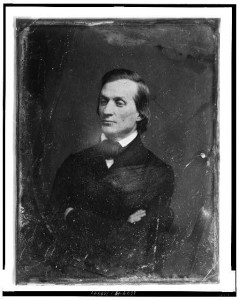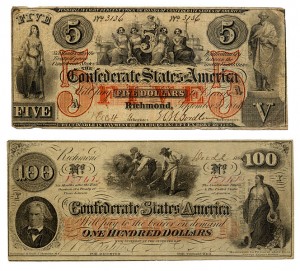Speculators; VMI back at turning out officers; CSA $5 note
From The New-York Times January 5, 1862:
MISCELLANEOUS ITEMS.
The Baton Rogue Sugar Planter has been discontinued for want of paper.
Gov. LETCHER has appointed delegates to represent Virginia in the Planter’s Convention of the South to be held in Memphis next month — February.
The Richmond Dispatch suggests as the Confedare in great need of arms just now, that the guns throughout the different camps, left there by volunteers who have died or been discharged, be collected and put to use.
The Dispatch scourges “the vampires who are sucking out the life-blood of the nation,” (secesh,) and doubts “if any age of the world has witnessed a spectacle like that now complained of by our own soldiers, growing out of the difficulty of obtaining settlements, which has led to the establishment of offices in this city (as we are informed) where they go and have their claims shaved and cashed.”
Gen. BORLAND, in command at Pocahontas, Ark., has embargoed White River, to prevent speculators from monopolizing and carrying off supplies.
Alluding to the Virginia Military Institute, the Richmond Whig, of the 20th inst., says: “The patriotic Professors of this Institution, who, at the first [???] of war, betook themselves to the field, have, prompted by the same patriotic considerations, been induced to turn to the less fascinating, but not less useful labors of teaching. If the war lasts, a fresh supply of instructed officers will be continually needed, and there existed no other means for obtaining them than by the Military Institute. Persuaded of this, the Board made provisions for reopening the Institute on the 1st of January, and the full complement of students has already been engaged. President DAVIS manifested a great interest in the matter, and in the handsomest manner furloughed the Professors, all of whom are officers in the service. It was no doubt painful to there gentlemen to abandon the theatre of glory, but they did not hesitate to respond to the call of duty.
The Editor of the Lynchburgh Republican has been shown a new Confederate note of the denomination of $5, only just issued, which is one of the most perfect specimens of workmanship he has ever seen. The note is the work of the Southern Banknote Company, of New-Orleans. The vignette is composed of a group of females, while in the distance are seen a woman bearing in her hands the scales of Justice, and a vessel under sail, indicating that the true wealth of the South lies in her commerce. On the right hand of the note is an accurate likeness of the Father of his Country, the immortal WASHINGTON, and on the left the figure of a beautiful virgin. The paper is excellent, and the engraving cannot be surpassed.
Solon Borland was a controversial public figure who served as US senator from Arkansas from 1848-1853. As the Civil War started Borland recruited troops in his state. Relating to this article in The Times:
While in his command position for the Northern Arkansas Militia, he ordered an embargo of goods to end price speculation, which was rescinded by Governor Rector. Borland protested that a governor could not countermand an order from a Confederate official, but in January 1862 his order was countermanded by the Confederate States Secretary of War at the time, Judah P. Benjamin. In declining health and resenting that embarrassment, Borland resigned from further service to the Confederacy in June, 1862…
Here’s a paragraph from the Baton Rouge newspaper that seems to reference the problem of getting paper to print on:
SUGAR PLANTER [WEST BATON ROUGE, LA], January 4, 1862, p. 2, c. 1
Our New Paper.—According to promise made last week, we present our readers with a colored paper. Curtailed of its fair proportions, it is a beautiful sheet, is it not?—Well! who’d have thought that we would be reduced to such stern necessity! It can’t be helped, therefore grieving over it will not help matters. When the yellow paper gives out we intend trying our hand at a new dodge in the newspaper line—nothing more nor less than using wall paper, good reader! We have bought a quantity, which if we can’t print on, we can paper our other room with. “When there’s a will there’s a way.” But the present issue—isn’t it glorious? Such nice envelope paper used for ordinary printing! As Macbeth said while gazing upon a handful of Baton Rouge shinplasters, “this is a sorry sight!”


